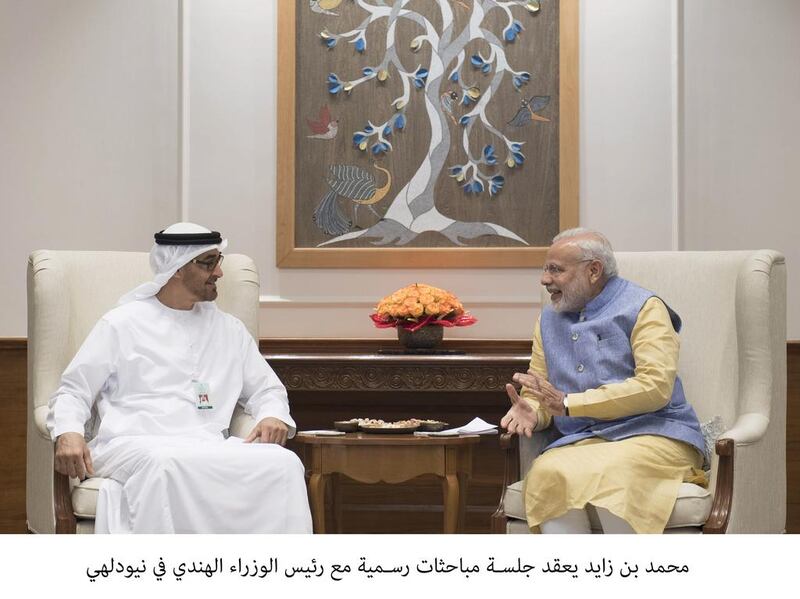NEW DELHI // Sheikh Mohammed bin Zayed on Wednesday held official talks with Narendra Modi, the prime minister of India.
The leaders discussed boosting ties between the two countries as well as several regional and international issues, including terrorism and violence.
Sheikh Mohammed, Crown Prince of Abu Dhabi and Deputy Supreme commander of the Armed Forces, met Mr Modi at Hyderabad House in the capital.
Mr Modi welcomed the UAE delegation, praising the special relationship between the countries and expressed the eagerness of both to increase cooperation.
Sheikh Mohammed thanked his hosts for their hospitality and congratulated the Indian people and government on the occasion of the 68th Republic Day.
He also conveyed the best wishes of Sheikh Khalifa, President of the UAE, and Sheikh Mohammed bin Rashid, Vice President and Ruler of Dubai.
Sheikh Mohammed said existing strong ties between the nations build on a rich heritage of friendship and cooperation.
He said he had sensed a shared desire among the leadership of both states to strengthen bilateral relations and develop them into one of the most important in the region and world.
The two leaders also stressed that the UAE and India shared a common interest in working for peace and stability in the region and the rest of world by helping to resolve disputes and conflicts by peaceful means.
The leaders penned memorandums of understanding and agreements on further cooperation in defence, shipping, road and maritime transpor, prevention of human trafficking, small and medium enterprises, innovation, agriculture, entry visas, media, trade, oil storage, energy and technology development.
Rajeev Sharma, a foreign policy expert based in New Delhi, said the agreements spelt out the commitment both countries had in broadening relations.
“Traditionally the countries partnership was based on two things – oil and the Indian diaspora in the Emirates,” said Mr Sharma. “New areas have come up and you can see relations flowering in every sector. The agreements in areas such as defence, cyber security, space, and infrastructure show that India and the UAE are reaching for much more,” he said.
With UAE being India’s third largest trade partner after China and the US, Mr Modi’s efforts in developing closer ties with Sheikh Mohammed was commendable, Mr Sharma said.
“The diplomatic symbolism is significant. Mr Modi deserves a pat on the back for breaking protocol in inviting someone who is not head of state to Republic Day and greeting him at the airport.”
Mr Sharma said the instability of the region coupled with the uncertainties that came with a new US President made the development of UAE-India ties all the more urgent.
While at Hyderabad House Sheikh Mohammed signed the visitor’s book, writing that the Indian constitution, which is celebrated every year on Republic Day, had laid the foundations for India to take on a steady course of growth and comprehensive development.
Sheikh Mohammed also attended a luncheon hosted by Mr Modi in his honour.
tsubaihi@thenational.ae






